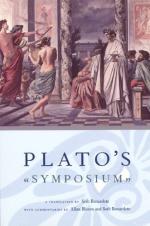
|
| Name: _________________________ | Period: ___________________ |
This test consists of 15 multiple choice questions and 5 short answer questions.
Multiple Choice Questions
1. Why are the speeches between Phaedrus and Pausanias left out of Aristodemus' account?
(a) There are no speeches between Phaedrus and Pausanias.
(b) They are incomplete.
(c) He does not think they are worth including.
(d) He does not remember them.
2. Which country does Pausanius use as an example of barbarian laws?
(a) Armolia.
(b) Olympi.
(c) Lithio.
(d) Ionia.
3. How is the muse, Urania, described in Eryximachus' speech?
(a) Heavenly, but unfair.
(b) Fair, but not heavenly.
(c) Fair and heavenly.
(d) Neither fair nor heavenly.
4. Whose thoughts inspire the guests to speak about love at the party?
(a) Pausanias.
(b) Aristodemus.
(c) Agathon.
(d) Phaedrus.
5. In Aristophanes' opinion, why do the gods make changes to humans?
(a) Out of the need for perfection.
(b) To earn the humans' trust and gratitude.
(c) To make sure that humans stay inferior.
(d) Out of mercy for humans.
6. What princess does Phaedrus use as an example for a sacrifice made out of Love?
(a) Cassandra.
(b) Europe.
(c) Ariadne.
(d) Alcestis.
7. Besides Apollodorus, to whom else has Aristodemus recounted the events of the party?
(a) Glaucon.
(b) Philip.
(c) No one.
(d) Phoenix.
8. According to Socrates, who changes proverbs about Agamemnon and Menelaus?
(a) Livy.
(b) Homer.
(c) Plato.
(d) Plutarch.
9. Why does Socrates refuse to attend Agathon's sacrifice of victory?
(a) He does not approve of many of the guests.
(b) He fears not enough people would be there.
(c) He does not agree with Agathon's victory.
(d) He fears the crowd.
10. In Phaedrus' opinion, which ancient Greek writer agrees with Hesiod's theory?
(a) Callinus.
(b) Acusilaus.
(c) Archilochus.
(d) Tyrtaeus.
11. What does Eryximachus believe to be the source of pestilence and destruction in nature?
(a) When a season refuses to change on time.
(b) When a season is overtaken by untested love.
(c) When a season is overtaken by violent love.
(d) When a season changes before its time.
12. According to Glaucon, what is the road to Athens made for?
(a) Conversation.
(b) Adventure.
(c) Amazement.
(d) Trouble.
13. How does Socrates feel about drinking?
(a) He does not drink at all.
(b) He can only drink a lot or not at all.
(c) He can either drink a lot, a little, or not at all.
(d) He can only drink a little or not at all.
14. Why does Apollodorus think that rich men pity him?
(a) Because they think he is ignorant.
(b) Because they think he is poor.
(c) Because they think he is unhappy.
(d) Because they think he is misinformed.
15. As explained by Phaedrus, how does Orpheus die as a result of his cowardice?
(a) He is dragged through the streets.
(b) He is thrown off of a cliff.
(c) At the hands of women.
(d) He is beaten with clubs.
Short Answer Questions
1. How does Socrates appear when he meets Aristodemus before going to the party?
2. According to Pausanius, what is the love of the body rather than the soul?
3. How does Eryximachus describe Polyhymnia?
4. What is one of the points that Eryximachus makes with Urania's story?
5. What effect does Phaedrus think Love has on a coward?
|
This section contains 541 words (approx. 2 pages at 300 words per page) |

|




